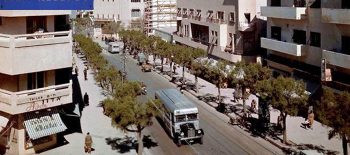Today is the anniversary of the outbreak of the Warsaw Uprising which is considered the significant Polish uprising against the Nazi German occupation during World War II.
The brutal repression of the uprising led to the destruction of the city of Warsaw and the deaths of some 200,000 Polish citizens.
Among the victims of the uprising was the national poet Krzystof Baczynski – a young man who wrote about nature and beauty and also about war, conscience, destruction and the national social catastrophe. Baczynski is one of the classics of Poland, is considered a representative of an entire generation and his poetry gained tremendous recognition after his death, when he was only 23 years old. Recently it also became clear that Baczynski was, in fact, of Jewish descent.
Some of his poems have also recently been translated into Hebrew, by Anat Zagorsky, and here is one of them:
buchają. O! za wiele,
za wiele miłości,
za mało ukochania.
Czarny dym się ściele.
Kwiaty są – martwe głownie,
domy są – jak trumny
w rozwalonym kościele,
gdzie Chrystus roztrzaskany
i oczy jego – rany.
I jego sercem bolisz,
ludu burz i niewoli.
Widzę cię, widzę w gromach,
wśród roztrzaskanych oblicz
posągów. O wy ciemni,
zwichrzeniu drzew podobni,
olbrzymi. Łańcuch słyszę
i batów jęk, i ciszę.
O ludu, ludu głuchy,
ty w bólu swym osobny,
jestżeś ty jeszcze ciałem,
czy już tylko swym duchem,
nikomu niepodobny,
w śmierci swojej osobny,
osobny w narodzeniu.
Smutny smutny mój ludu,
głowy opadną i wstaną,
ręce upadną i wstaną
nim cud. A doczekasz cudu.
Nim moc. A już czeka i słucha
Duch Boży – twego Ducha.




